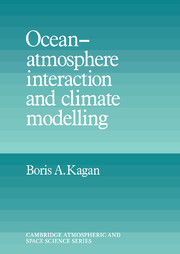Book contents
2 - Present state of the climatic system
Published online by Cambridge University Press: 15 January 2010
Summary
Let us examine the budget of mass, energy, angular momentum and carbon. The presence of the latter in this list is explained by two reasons. First, the carbon budget is interesting in itself. Second, it is closely related to the atmospheric CO2 problem, without solving which it is impossible to estimate the role of anthropogenic factors in climate changes.
In summarizing the factual data we will follow Peixóto and Oort (1984) for the most part.
Initial information
There are at present about 2000 weather stations for atmospheric sounding where horizontal wind velocity, temperature, humidity and isobaric surface height for 11 levels in the atmosphere are measured twice a day. The amount of information from these stations is enormous. Even if we exclude all monthly series with data gaps exceeding ten days, then during the decade covering May 1963 to April 1973 we obtained 10 × 365 × 2 × 100 × 11 × 5 = 4 × 10 information units. Here the first number specifies the number of years, the second specifies the number of days in a year, the third specifies the number of daily series of measurements, the fourth specifies the number of stations providing qualitative information, the fifth specifies the number of measurement levels in the atmosphere and the sixth specifies the number of measured parameters. The amount of information is thus sufficient to detect large-scale peculiarities in the atmospheric climate.
- Type
- Chapter
- Information
- Ocean Atmosphere Interaction and Climate Modeling , pp. 45 - 106Publisher: Cambridge University PressPrint publication year: 1995
- 1
- Cited by



